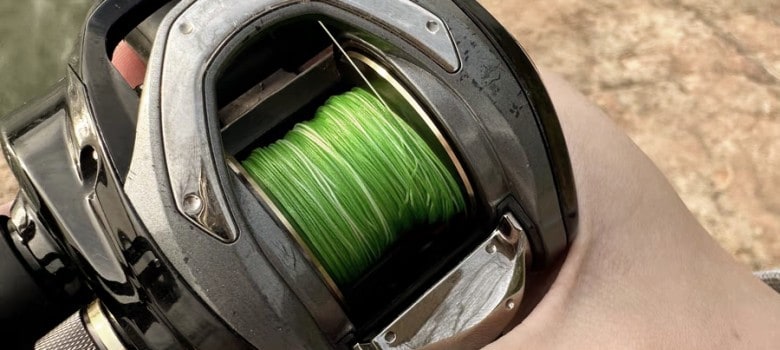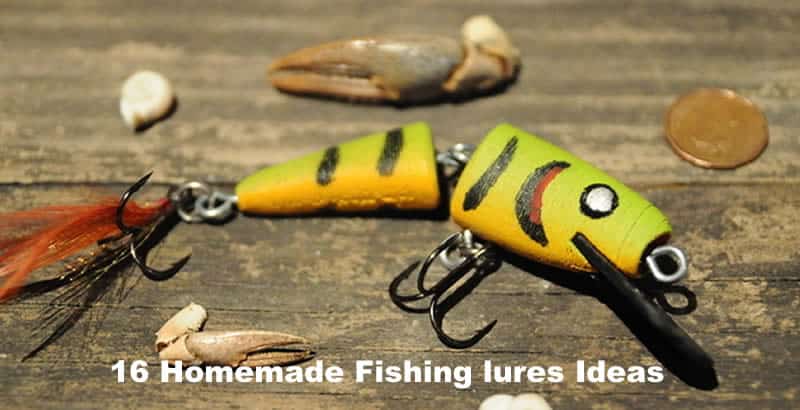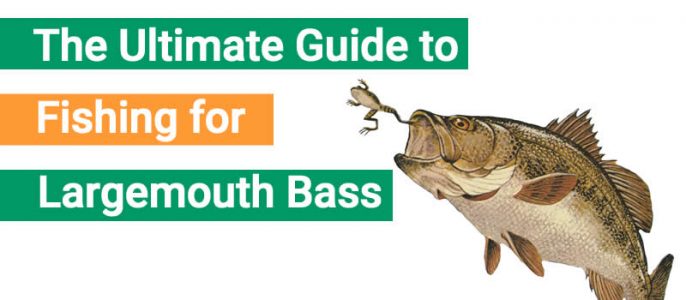If you buy via a link on this page, we may receive a commission, at no extra cost to you.Learn more
Using a heavier line doesn’t mean that you will get more fish or that the line won’t break. I’ve lost count of the anglers that make this mistake, which keeps them from getting the most out of their gear.
Some of the consequences of using a fishing line that is too heavy are:
- Loss of sensibility
- Increased chance of breaking your rod
- Line guides are more likely to snap
- Bird nests
- It is harder to cast
- Lesser line capacity
Now that you know what using a heavy line does, it is time to learn how to choose one. I will explain why you shouldn’t go too heavy or too light. Let’s get down to it!
What Does Line Weight Mean?

I used to think it referred to how much the line weighs. Naturally, I then discovered it relates to how much it handles before breaking. The heavier the line, the more it takes to break it. That’s why these are ideal for big gamefish.
Keep in mind that abrasion, time, and usage affects the line’s tensile strength.
Some anglers also refer to line weight as test strength. But it is not as common.
How Heavy My Fishing Line Should Be?
Let’s start our discussion with how heavy your line should be. It roughly has to match the weight of the fish you are after. For example, you should use a 12-pounder if you are fishing for bass. This doesn’t mean that you can’t catch anything heavier. I’ve landed several heavy fish on a thin line. However, it requires more attention and good rod skills.
Another way is looking at the rod’s label. It should show both the compatible reel sizes and line weights. In my experience, you should not put this label to the test.
Similarly, most reels have a label or brochure displaying compatible line sizes. Again, I advise you to stick to those ranges.
Can a Fishing Line Be Too Heavy?
Yes. It can be. For example, if your rod is only compatible with lines up to 10 pounds, using a 15-pound line will only make you break your rod. It will also tear or bend the line guides, rendering your rod useless.
Using lines that are too heavy brings more than just mechanical issues. It also makes casting light lures more difficult because the line is heavier than the lure.
On the other hand, the increased friction with the line guides makes bird nests more likely.
Loss of sensibility is another huge problem, especially if you are targeting picky eaters. You see, you won’t feel the vibrations if you use a 20-pound line to fish for trout. It will absorb the shock, keeping it from traveling all the way to your rod and handle.
Few beginners know that reels also come with a compatible line label. The problem with using a heavier line here is that the line capacity will be even lower than advertised. Believe me. Nothing is as stressful as keeping an eye on the spool because the fish is running away with the line. Plus, the gears are prone to grind, ultimately breaking the reel. This is an unnecessary risk because lines and lures are cheaper than a good-quality reel.
As you can see, there is no advantage to using a fishing line that is too heavy. So, stay within the range shown on the label.
Is a Heavier Line Harder To Cast?
In my experience, casting a heavy line with adequate terminal tackle is harder than a light one. You see, a heavy line is thicker, which increases friction with the line guides and air. It takes more effort to make the movements as a result. Plus, as we discussed before, it makes bird nests more likely to happen.
It can get even worse if you don’t use adequate terminal tackle. It tried to cast heavy lines with feather-like lures. It is impossible. I almost sprained my shoulder from all the effort needed to move the lure. In contrast, using lures that are too heavy for the line will only increase the chances of it snapping.
Is a Heavier Line Less Sensible?
Sadly, the answer to this question is not a simple yes or no, as it depends on the fish you manage to catch. Let’s say that you are fishing for trout. I typically use a 6-pound test line here. It gives me a decent balance between strength and sensibility.
Now let’s assume that I use a 20-pound test line instead. Because trout are not that heavy, the line will absorb any shocks the fish might cause. Therefore, you will have a hard time telling whether a fish is on.
Another problem I’ve noticed with heavier lines on light fish is that you are more likely to cause more damage to the fish. I’ve rid the hook off straight out of the mouth simply because a heavy line stretches less.
Does a Heavy Line Mean More Heavy Fish?
Most beginners think that using a heavy line automatically means catching heavy fish. Needless to say, this is not true. It has more to do with your lure/bait, body and water, and overall setup. Using the right line is only one of the items to tick.
On the other hand, using a thin line does not mean you will only catch light fish. It will only make it harder for you to land it! In the first scenario, the line won’t be sensible enough to transmit the bites of a tiny fish. So you must pay extra attention to detect tony vibrations. In the second scenario, the fish will put too much strain on the line, making it more likely to snap. Thus, you will need to play with the drag to exhaust the fish so it doesn’t fight as hard while you reel it in.
Is Lighter Fishing Line Better?
Using lines that are too light is also a problem! First, it will be harder to land the fish as the line will be at the breaking limit. Not only because of the fish, but the rod won’t absorb the tension as it is supposed to, transferring everything to the line.
However, I rather go too light than too heavy, mainly because I fish for bass and trout. Thus, most of my setups are light/ultralight. In any case, remember to stay within the rod and reel label range.
Does a Heavier Fishing Line Sink Faster?
Yes. The heavier the line is, the faster it sinks. You might think that this is not a problem. But it is.
Let’s say you are fishing bass with a topwater lure. As the name suggests, you want this lure to remain above the water. Therefore, you must take all the necessary precautions to keep the lure afloat. This includes using a light, thin line.
However, this doesn’t mean you must use a heavy line if you are fishing deep. As we discussed earlier, you must choose the line weight taking the fish, rod, and reel into account.
Is Fluorocarbon Heavier than Monofilament?
Many people think that fluorocarbon and braid are both heavier than mono. The confusion arises because, for a fixed weight, fluorocarbon and braid are slimmer than monofilament.
But this is because monofilament has a lesser tensile strength, resulting in an increased diameter to offset the lack of power.
But hey! This doesn’t mean that you should use braid or fluorocarbon instead of monofilament. Fluoro is much more expensive than the other two. Plus, some fishing reels are incompatible with braid without adding some monofilament backing.
The Weight Matters: Choose The Right One
Picking the correct line weight is one step to getting your setup right. I recommend following the labels on the rod and reel, as both show compatible line weights. You can then fine-tune your selection to suit your needs. However, if you need more warning, you should know that using a line that is too heavy only makes your rod more likely to snap. Plus, it will be impossible to use topwater lures, and casting light lures will be challenging.
Heavier lines also take up more space in the spool. Thus, lowering the capacity of your reel and putting unnecessary strain on the gears.
Lastly, heavy lines are typically less sensible as they are meant to be used to catch bigger and stronger fish. Thus, they won’t transmit the tiny movements made by smaller fish.




